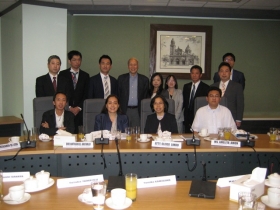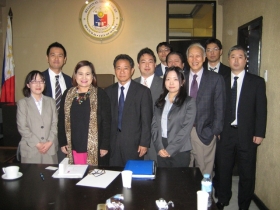Topics
Int’l Committee trip to Singapore and The Philippines
With Japanese companies having a growing interest in the ASEAN countries, the International 4th Committee sent investigation teams to Singapore during November 2-8, 2014 and to the Philippines during November 9-16, 2014, and held meetings with the following IP groups.
°„Philippines°š
Philippines Intellectual Property Office, Supreme Court, anti-piracy task force of the Department of Justice, intellectual property right section of the National Bureau of Investigation, Special Commercial Court, intellectual property right section of the Customs, Romulo Mabanta Buenaventura Sayoc & de los Angeles law firm, EB Astudillo & Associates law firm, SyCip Salazar Hernandez & Gatmaitan law firm
°„Singapore°š
Singapore Patent Office, Ministry of Justice, A * STAR, Supreme Court, JETRO Singapore, Singapore Patent Attorneys Association, EDB, Singapore office of TMI comprehensive law firm, Allen and Gledhill law firm, Drew & Napier law firm, Spruson & Ferguson patent office place, Nitto Denko
In the meetings with the above organizations, they were very friendly and helpful in responding to our requests, and the team was able to collect information which could not be obtained only by literature researches and other means in Japan.
Particularly in the Philippines, the team was able to investigate the usage and operational situation of PPH and ASPEC, systems for acquiring patent rights quickly. With respect to exploitation of the rights, the team was also able to investigate how to effectively utilize multiple government agencies such as the Intellectual Property Office, the Legal Affairs Bureau, the anti-piracy task force of the Department of Justice, and the intellectual property right section of the National Bureau of Investigation.
In addition, the amended patent law was enforced in February this year in Singapore, resulting in changes having great impacts on the practice such as abolition of the self-assessment system and abolition of the Fast Track / Slow Track system, and a new provision that an auxiliary request for examination be essential even if the modified substantive examination is selected. In addition, the Intellectual Property Office published its IP Hub Master plan in March last year, which proposes that the country should become an IP hub in Asia in the next 10 years. The amended law and the plan include a lot of unclear specific contents, which made it difficult for Japanese companies to understand what aspects they are advantageous or disadvantageous in. But the investigation enabled us to understand those contents especially from both sides of the "acquisition of patents" and the "enforcement." They also made us feel that the future trends thereof need to be carefully monitored.
Details of the investigation will be reported in the future by way of special workshops and documentation.
[Update 2015-02-06 ]


